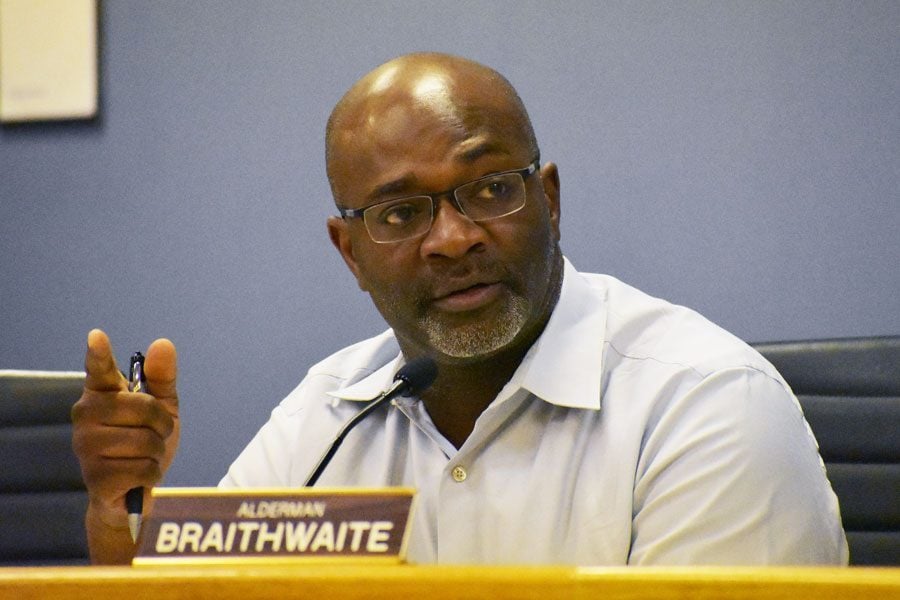Human Services Committee discusses issues of free speech after Confederate flag incident
Daily file photo by Emma Edmund
Ald. Peter Braithwaite (2nd). Braithwaite said he does not want the recent Confederate flag incident to distract city officials from other initiatives.
August 3, 2020
Evanston’s Human Services Committee discussed issues regarding the public display of items on public property during a Monday meeting.
The discussion was sparked by last week’s events at Lighthouse Beach, where a white group displayed a Confederate flag towel.
Corporation Counsel Kelley Gandurski said displaying symbols like the Confederate flag is a First Amendment issue, and that free speech is usually protected regardless of its content. Gandurski argued the only cases in which free speech would not be protected are those in which there is an imminent threat of harm, such as shouting “fire” in a crowded theater.
Gandurski said she looked into what other municipalities have done in terms of prohibiting symbols depicting hate, prejudice and racism. She found that some cities have passed resolutions banning these symbols on city property. However, she said banning these symbols across the board is not typically done. She also said if laws or resolutions are going to limit speech, they must pass strict scrutiny, which means they must be narrowly tailored to achieve what a municipality means to achieve without censoring the speech.
With the Confederate flag at Lighthouse Beach, staff members were easily able to resolve the issue because no one is permitted to hang items on city property — a reasoning she called “content neutral.”
“Whether it be towels to dry on a fence or hanging up something on a city building, that’s just not allowed generally…for health and safety reasons,” Gandurski said. “Outright banning speech and symbols across the board is something that municipalities and governments have to be very careful about because the Supreme Court, you know, has upheld the right to free speech absent those imminent threatening circumstances.”
Ald. Robin Rue Simmons (5th) said she is hoping the Confederate flag can be banned as a symbol of hate from all city facilities and events. Although the First Amendment limits what city officials can do pertaining to the law, Rue Simmons expressed an interest in making a statement that makes it clear that the recent display of the flag directly contradicts Evanston’s values.
Rue Simmons also inquired if a law banning the flag from all city facilities would include guests, whether they obtained a permit to hang items on city property or they participated in a city-sponsored program. Gandurski said this is more difficult to include in a law or resolution due to the specific language that would be required in order to avoid obstruction of individuals’ right to free speech.
“You, for instance, would not be able to ban a patron from wearing his or her Confederate flag t-shirt coming to the beach, so you’d have to look at the specific language of what the council would like to do,” Gandurski said. “I think we’d have to pull the examples of other municipalities that have done this, and look at their specific wording, and see what challenges, if any, they’ve faced and if they were (able) to overcome those challenges successfully.”
Rue Simmons then asked what impact banning the Confederate flag would have on other forms of expression, such as Black Lives Matter or any other movement some would try to argue promotes hate speech.
“Different symbols mean different things to different people…Generally speaking, that definition is left more objectively, and in some cases subjectively, depending upon the group and what it means to the group,” Gandurski said. “We all know what that flag means…but to others, they may disagree and and in terms of their First Amendment right…they have a right to disagree.”
Ald. Peter Braithwaite (2nd) said that while he believes this conversation is important, he does not want the committee to become distracted amidst everything else its members are focusing on at the moment, such as reparations, police reform and COVID-19.
“The Confederate flag has no power over me or anyone who looks like me in the setting that we’re in right now…we don’t see anything like this displayed on any resident; my understanding is this was a person who was passing through our community.” Braithwaite said. “I’m just thankful that we have residents that stood up the way that they do, and again, I want us to stay focused on the work that we have ahead.”
Email: [email protected]
Twitter: @juliaa_grace
Related Stories:


